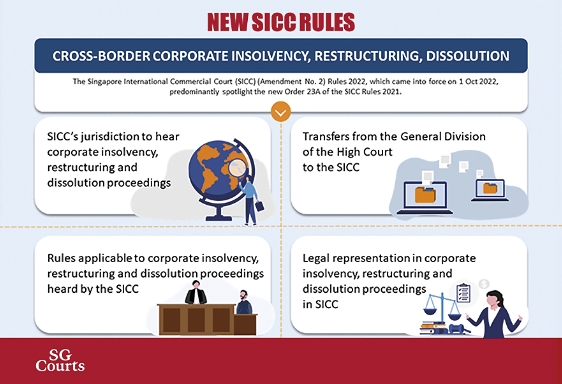In 2022, as Singapore finally began to emerge from the long shadow of the pandemic, we turned our focus firmly towards the future. At the Opening of the Legal Year, I suggested that the next phase of our journey would require us to go beyond the adjudication of discrete disputes and hone our vision for the SG Courts as the national institution entrusted with the administration of justice. To excel in the administration of justice, I suggested that the courts should prioritise three key themes: enhancing judicial capabilities, building a user-centric court system, and promoting international judicial engagement. These themes informed the work of the SG Courts in 2022.
First, we have made significant investments to systematically enhance our judicial capabilities. On 1 April 2022, we brought the Rules of Court 2021 and Singapore International Commercial Court Rules 2021 into force. This marks a very significant change in the way civil litigation is conducted by the parties and managed by the courts. To achieve the ideals of fair access to justice, efficiency and proportionality that are embodied in the new Rules, judicial officers and court administrators worked tirelessly to update our court processes and to gather and respond to stakeholder feedback. Besides innovations that enhance the judicial toolbox, we have also renewed our focus on judicial education and training. To this end, the Singapore Judicial College has been restructured and expanded to more effectively devise and deliver training that is tailored to the needs of judges.
Next, we have sought to adopt a user-centric approach to the design of our court system and the functioning of our courts. This involves recognising that the courts should provide neutral and objective assistance to court users, especially self-represented persons, as they navigate the judicial process. Thus, the State Courts made its Guidebook for Accused in Person available in all four official languages in 2022 to help those accused of criminal offences who do not have legal representation to better understand the criminal justice process. Likewise, the Family Justice Courts (FJC) published an updated and expanded edition of the Family Orders Guide and organised a series of webinars and roadshows under the banner of Family Justice @ Heartlands to help demystify family justice. To ensure that we take a systematic approach towards communicating with and engaging our court users, we also unified the communications and outreach functions of the Supreme Court, State Courts and FJC into a single Communications & Service Excellence Division. This was part of a wide-ranging effort to integrate our three courts into One Judiciary.
Finally, the SG Courts have continued to actively engage with our counterparts from other jurisdictions. This allows us to benefit from the collective experience and wisdom of judiciaries around the world. In 2022, we continued our high-level engagements with the judiciaries of the People’s Republic of China, Rwanda and our ASEAN neighbours, among others. The State Courts broke new ground by organising the inaugural Tribunals Conference and bringing together the International Judicial Dispute Resolution Network. The Supreme Court set up a Commercial Practice Panel to identify best practices in commercial litigation from across the world, and continued to participate actively in the Standing International Forum of Commercial Courts. In the area of commercial disputes in particular, international judicial engagement has the unique potential to contribute towards the development of a transnational system of commercial justice. This involves convergence towards a broadly common set of substantive and procedural norms and values for the regulation of transnational commerce, which would help reduce legal uncertainty, encourage growth, and promote the global rule of law. We should not underestimate the value of judicial diplomacy and interaction in moving us towards these valuable goals.
These efforts of the SG Courts in 2022 mark the first phases of a project to transform and future-proof the Judiciary, which will be the focal point for much of our energies in the coming years. The realisation of this vision will be essential if our courts are to remain prepared to respond to the considerable challenges that our society will face in the coming years, as well as the frequent and ongoing changes to our operating environment.
Indeed, as 2022 was drawing to a close, the launch of ChatGPT took the world by storm and put an end to any lingering doubts over whether artificial intelligence and related technologies would radically disrupt and transform the practice of law and the delivery of justice. More such watershed moments are sure to come, and we will need to be nimble and forward-looking if we are to tackle the challenges that such changes will bring and seize the opportunities that they will present to secure the promise of access to justice for all.

Sundaresh Menon
Chief JusticeSupreme Court of Singapore






